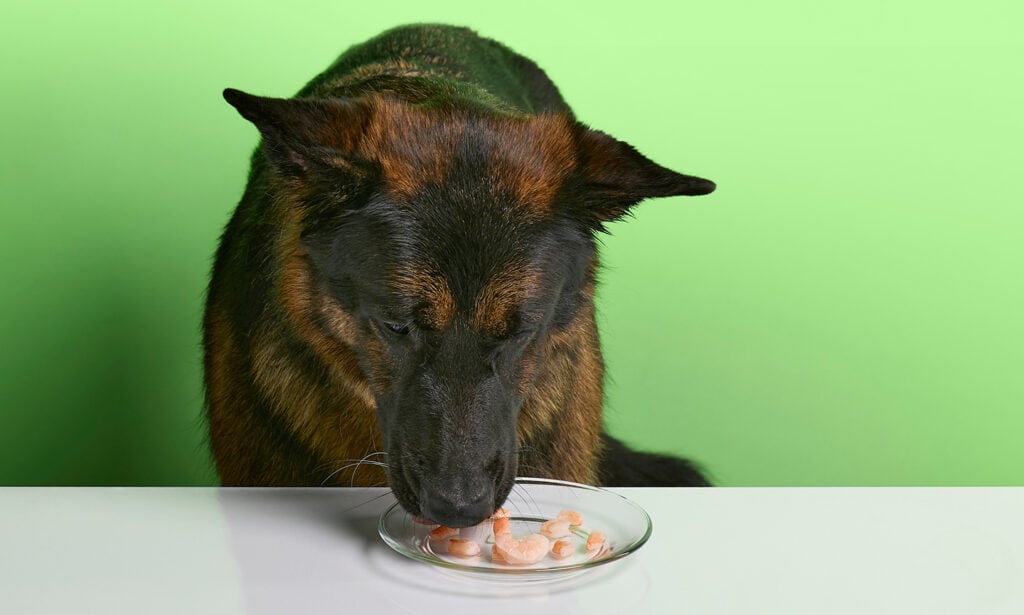Yes, dogs can eat shrimp. But it should be plain and cooked.
Raw shrimp can carry harmful bacteria. Shrimp is a tasty seafood loved by many. But, is it safe for our furry friends? As dog owners, we always want the best for our pets. Understanding what they can and cannot eat is crucial.
Shrimp can be a healthy treat for dogs. It is low in calories and high in nutrients. But there are some things to consider. How should it be prepared? What are the benefits and risks? This blog post will explore these questions. We’ll help you make an informed decision about feeding shrimp to your dog. Keep reading to learn more about the dos and don’ts of serving shrimp to your canine companion.

Credit: www.kinship.com
Introduction To Dogs And Shrimp
Dogs and shrimp both have unique dietary needs. Shrimp can be a healthy treat for dogs when cooked properly. Always remove the shell and ensure it’s free from seasonings.
Dogs are curious creatures. They often want to taste what their humans eat. Shrimp is a popular seafood. Many dog owners wonder if it’s safe for dogs. This blog answers that question.Common Dietary Questions
Pet owners often have questions about dog diets. They want to know what foods are safe. Shrimp is one such food. People ask if dogs can eat shrimp. They worry about allergies and health risks. Understanding safe foods is important.Importance Of Safe Foods
Dogs need safe and healthy foods. Unsafe foods can cause health problems. Shrimp can be safe for dogs. It must be cooked and plain. Raw shrimp can be harmful. Seasonings and spices can upset a dog’s stomach. Always ensure shrimp is safe before feeding it to dogs. “`
Credit: roguepetscience.com
Nutritional Value Of Shrimp
Shrimp offers high protein, essential vitamins, and minerals, making it nutritious for dogs. Always ensure it’s cooked and given in moderation.
Shrimp is a seafood packed with nutrients. It can be a healthy addition to your dog’s diet. But what exactly makes shrimp so nutritious? Let’s explore.Key Nutrients In Shrimp
Shrimp contains high-quality protein. Protein helps build and repair tissues. It also supports muscle growth. Shrimp is rich in essential amino acids. These are vital for your dog’s health. Shrimp is a good source of vitamins. It contains vitamin B12, which supports the nervous system. Shrimp also has vitamin D, important for bone health. Selenium, an antioxidant, is present in shrimp. It helps protect cells from damage. Shrimp provides omega-3 fatty acids. These are good for your dog’s skin and coat. Omega-3s also support heart health. Shrimp contains minerals like zinc and phosphorus. These minerals are important for overall well-being.Caloric Content
Shrimp is low in calories. This makes it a good treat for dogs. A 3-ounce serving of shrimp has about 84 calories. This means it won’t add too many calories to your dog’s diet. Shrimp is also low in fat. This is beneficial for dogs who need to manage their weight. Always serve shrimp in moderation. Too much of anything can be harmful. Shrimp is a healthy option when given in small amounts. It offers many nutrients without extra calories. Always cook shrimp before giving it to your dog. Raw shrimp can carry harmful bacteria. “`Health Benefits Of Shrimp For Dogs
When considering adding shrimp to your dog’s diet, you might wonder about the health benefits. Shrimp can offer several advantages for your furry friend when fed in moderation and properly cooked. Let’s delve into the specific benefits of shrimp for dogs.
Protein Source
Shrimp is an excellent source of protein. Dogs need protein to build and repair tissues, and shrimp can be a tasty way to help meet those needs.
If your dog enjoys shrimp, it could be a great alternative to traditional meat proteins. Just ensure it’s cooked and the shell is removed to prevent choking hazards.
Think about how your dog might appreciate a new protein source. Does your dog get excited about new foods?
Omega-3 Fatty Acids
Shrimp is rich in omega-3 fatty acids. These are essential for maintaining a healthy coat and skin.
Omega-3s can also support heart health and reduce inflammation. It’s like giving your dog a little boost from the inside out.
Imagine your dog’s fur looking shinier and healthier. Wouldn’t that make you both happy?
Vitamins And Minerals
Shrimp contains several important vitamins and minerals. Vitamin B12, for example, helps with brain function and energy levels.
Other minerals like phosphorus and iodine are crucial for various bodily functions. Shrimp could be a great way to add these nutrients to your dog’s diet.
Are you looking for ways to improve your dog’s overall health? Maybe shrimp is worth considering!
Incorporating shrimp into your dog’s diet can be beneficial. Always ensure it’s cooked and served properly. Your dog deserves the best, and shrimp could be a great addition to their meals.

Credit: be.chewy.com
Potential Risks Of Feeding Shrimp
Feeding shrimp to dogs might seem like a tasty treat, but it comes with risks. Understanding these risks can help keep your dog safe and healthy. Let’s explore the potential dangers of feeding shrimp to your furry friend.
Allergic Reactions
Some dogs might be allergic to shrimp. Allergic reactions can cause itching, swelling, and even difficulty breathing. If your dog shows these symptoms, contact your vet immediately. It’s crucial to monitor your dog after feeding shrimp for the first time.
Choking Hazards
Shrimp shells and tails can pose choking hazards. Dogs might not chew these parts properly, leading to blockages in their throat. Always remove shells and tails before feeding shrimp to your dog. Cut the shrimp into small pieces to prevent choking.
Contaminants
Shrimp might contain harmful bacteria or toxins. These contaminants can cause digestive issues or food poisoning in dogs. Always cook shrimp thoroughly to kill any harmful bacteria. Avoid feeding raw or undercooked shrimp to your dog.
Safe Preparation Methods
Many dog owners wonder if shrimp is safe for their furry friends. The answer is yes, but it must be prepared correctly. Proper preparation ensures your dog enjoys shrimp without any risks. Let’s explore the best ways to prepare shrimp for dogs.
Cooking Shrimp
Always cook shrimp before giving it to your dog. Raw shrimp can carry harmful bacteria. Boil or steam shrimp until it turns pink and opaque. Never use oil or butter for cooking. These can upset your dog’s stomach.
Avoiding Seasonings
Do not add seasonings to shrimp meant for dogs. Salt, garlic, and onions are toxic to dogs. Plain, unseasoned shrimp is the safest option. Ensure the shrimp is completely free of any sauces or spices.
Proper Portions
Feed shrimp to your dog in small amounts. Too much shrimp can cause digestive issues. Start with one or two shrimp. Monitor your dog’s reaction before giving more. Shrimp should be an occasional treat, not a regular meal.
Signs Of Allergic Reactions
Dogs can eat shrimp, but watch for signs of allergic reactions. Symptoms include itching, swelling, or difficulty breathing. Consult a vet if you notice any of these.
Shrimp can be a tasty treat for your dog, but it’s crucial to be aware of potential allergic reactions. Dogs can have allergies just like humans, and shrimp might trigger them. Knowing the signs of allergic reactions can help you act quickly and ensure your furry friend stays healthy.Common Symptoms
If your dog is allergic to shrimp, you might notice several common symptoms. These include itching, redness, and swelling, especially around the face, paws, and ears. Your dog may also start scratching excessively or licking the affected areas. Another symptom to watch for is gastrointestinal upset. Vomiting, diarrhea, and loss of appetite are signs that your dog might be reacting poorly to shrimp. Keep an eye on their behavior after eating shrimp to spot these issues early. Breathing difficulties can also occur. Wheezing, coughing, and difficulty breathing are serious symptoms that need immediate attention. If you notice these signs, it’s time to act quickly.When To Seek Veterinary Help
You should seek veterinary help if your dog shows any severe symptoms. Difficulty breathing or extensive swelling is a red flag that requires professional care. These symptoms can escalate quickly and need prompt treatment. Persistent vomiting and diarrhea are also concerning. If these symptoms last more than a day, consult your vet. Continuous gastrointestinal issues can lead to dehydration and other complications. If your dog seems unusually lethargic or is in visible distress, don’t wait. It’s better to get expert advice early than to risk your dog’s health. Your vet can provide the necessary treatment and guidance. Have you ever dealt with a food allergy in your dog? Share your experiences in the comments below. Your insights might help another pet owner! Remember, while shrimp can be a delightful snack, being vigilant about allergic reactions ensures your dog stays safe and happy.Alternative Seafood Options
Dogs can eat shrimp in moderation. Shrimp offers protein and nutrients, but should be cooked and unseasoned. Consult a vet before introducing shrimp to your dog’s diet.
If you’re considering offering your dog a little seafood treat but aren’t sure about shrimp, there are plenty of other options to explore. Let’s look at some alternative seafood choices that are safe and healthy for your furry friend. ###Fish
Fish is an excellent source of omega-3 fatty acids, which support your dog’s skin and coat health. Salmon and sardines are particularly good choices because they are rich in essential nutrients. However, always cook the fish properly to avoid any harmful bacteria. ###Crab
Crab meat can be a delightful treat for your dog, but it’s important to remove the shell completely. The shells can be sharp and dangerous if ingested. Plain, cooked crab meat provides protein and essential vitamins like B12. ###Lobster
Lobster is another seafood option that can be given to dogs in moderation. Ensure it’s fully cooked and free from any seasoning or butter. Lobster meat is packed with lean protein and minerals that can benefit your dog’s health. Remember, moderation is key when introducing new foods to your dog’s diet. Have you ever tried giving your dog any of these seafood options? How did they react? Share your experiences in the comments below!Frequently Asked Questions
Can Dogs Eat Cooked Shrimp?
Yes, dogs can eat cooked shrimp. Ensure it’s plain, without seasoning or garlic. Cooked shrimp provides protein and nutrients. Avoid feeding raw shrimp.
What Seafood Should Dogs Not Eat?
Dogs should not eat raw fish, shellfish, or fish with high mercury levels like tuna and swordfish. Avoid fish bones.
How Many Shrimps Can A Dog Have?
Dogs can eat shrimp in moderation. Limit their intake to a few shrimp per week. Always cook shrimp and remove the shell before serving. Consult your vet for personalized advice.
Is Shrimp A Common Dog Allergy?
Yes, shrimp can be a common dog allergy. Symptoms include itching, vomiting, and diarrhea. Consult a vet if your dog shows signs.
Conclusion
Dogs can enjoy shrimp in moderation. Always cook the shrimp thoroughly. Avoid adding seasonings. Remove the shell before serving. Watch for any allergic reactions. Start with small amounts. Monitor your dog’s health. Shrimp can be a treat, not a meal.
Consult your vet for personalized advice. Keep your furry friend happy and healthy with safe treats.
